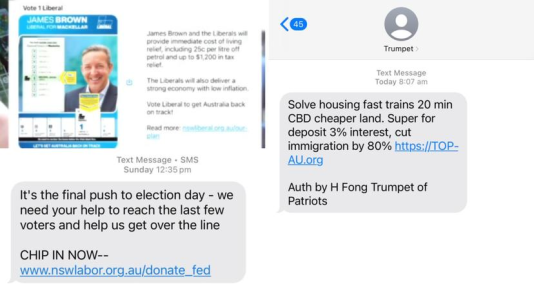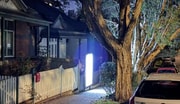Sick of election spam texts? Here’s why you can’t block them—and what it reveals about the system
By
Maan
- Replies 0
Election campaigns are always a busy time—but not all the noise is coming from debates and TV ads this year.
As the countdown to the federal election continues, growing frustration among voters has put a spotlight on an issue that some say exposes major flaws in our political system.
What has sparked such widespread outrage — and why are so many Australians calling for change?
Australians gearing up for the 3 May federal election found themselves bombarded with a stream of unsolicited political text messages—and many were not impressed.
Voters took to social media to vent their frustration, saying the messages felt invasive and offered no way to opt out.
Among the most active texters was Clive Palmer’s Trumpet of Patriots, which sparked widespread ire across the country.
Despite the outcry, the practice remained legal, with political parties exempt from the Spam Act and the Do Not Call register.
Journalist James Willis said, ‘The spam act needs to change.’
Willis admitted he had been targeted multiple times, saying: ‘Clive texted me twice yesterday, once the day before — now at reasonable hours, he didn’t text me after dark which I’m very grateful about.’
‘But they are ridiculous and they’re part of what is, I think, a major flaw in our election system.’
He pointed out that the problem extended beyond text messages, criticising the broader spread of political advertising and messaging online.
‘Not just the texts, but some of the stuff that’s on social media—some of the other political advertising and messaging that is out there that is not properly authorised or you’re not sure where the source of the funding or the material is,’ he said.
‘We’ve got deep flaws in our election system and I think these texts are a good example.’
Willis also raised concerns about how political parties were obtaining voters’ phone numbers, asking: ‘Where is this big list?’
He said that phone polling during elections posed another major issue.
Western Sydney Women Founding Director Amanda Rose also criticised the current rules, highlighting that there were no laws forcing political texts to be truthful.
‘They can say whatever they want,’ Rose said.
She warned that bombarding voters with unwanted messages could backfire badly, just like in any form of texting or email communication.
‘Our laws need to change and we actually need to make sure that whatever a politician or a party is saying is the truth,’ she said.
Rose also called for a mandatory opt-out option for political texts.
Voters shared screenshots and complaints online, particularly targeting the Trumpet of Patriots.
‘I never signed up for these,’ one person wrote.
‘I realise if I give a business my number they can text me but they have an opt-out option. These blasted Palmer texts don’t allow you to stop them and you can’t even block!’
Another voter commented: ‘Man I’m over these Trumpet of Patriots texts. Is any one else getting them? I’ve blocked three of them already but they keep coming back.’
A growing trend saw angry recipients replying with expletives, but these responses could not be delivered.
Trumpet of Patriots was contacted for comment.
Meanwhile, controversy also brewed over political signage at polling venues and public areas.
An electronic traffic sign in Lane Cove on Sydney’s Lower North Shore was spotted displaying the message ‘put Labor last’ over the weekend.
A similar sign was seen near CommBank Stadium in Greater Western Sydney.
On social media, users questioned whether the signage was legitimate, given that electoral communications must be properly authorised under the Commonwealth Electoral Act 1918.
The Australian Electoral Commission (AEC) confirmed that electoral communications must include authorisation details so voters can verify the source.
‘The Commonwealth Electoral Act 1918 requires certain communications to have an authorisation statement or message declaring details about the person or entity that is responsible for the communication,’ the AEC stated.
The AEC urged Australians to exercise caution when consuming political material, recommending they ‘stop and consider what they’re seeing, check multiple sources of information and have a healthy level of scepticism around anything they’re consuming.’
‘There are plenty of resources around for voters to draw on when it comes to information about the voting process and of course campaigning messages from various sources as well,’ the AEC shared.
Lane Cove Council and City of Parramatta were contacted for comment regarding the unauthorised signs.
Further tensions flared in Melbourne, where disputes arose over signage at an early voting centre on High St, Kew, in the electorate of Kooyong.
Boroondara Council reportedly asked political parties to limit signage to one sign per candidate on public land.
However, Liberal Party candidate Amelia Hamer allegedly refused to comply.
One person took to social media to describe the dangers, saying, ‘I just saw someone try to cross the road and get stuck behind the signs while four lanes of peak hour traffic flies by.’
Council officers had reportedly raised concerns about driver visibility, particularly with children crossing near Kew Primary School just 30 metres away.
Both Hamer’s office and Boroondara Council were contacted for comment.
In a previous story, we explored the latest updates on election-day procedures and key changes voters need to be aware of.
If you’re still unsure about how to make your voice heard, we’ve got more details to help you navigate the process.
Be sure to check it out for all the essential info you need before heading to the polls.

With election day fast approaching, do you think Australia’s political campaigning rules need an urgent overhaul? Let us know your thoughts in the comments.
As the countdown to the federal election continues, growing frustration among voters has put a spotlight on an issue that some say exposes major flaws in our political system.
What has sparked such widespread outrage — and why are so many Australians calling for change?
Australians gearing up for the 3 May federal election found themselves bombarded with a stream of unsolicited political text messages—and many were not impressed.
Voters took to social media to vent their frustration, saying the messages felt invasive and offered no way to opt out.
Among the most active texters was Clive Palmer’s Trumpet of Patriots, which sparked widespread ire across the country.
Despite the outcry, the practice remained legal, with political parties exempt from the Spam Act and the Do Not Call register.
Journalist James Willis said, ‘The spam act needs to change.’
Willis admitted he had been targeted multiple times, saying: ‘Clive texted me twice yesterday, once the day before — now at reasonable hours, he didn’t text me after dark which I’m very grateful about.’
‘But they are ridiculous and they’re part of what is, I think, a major flaw in our election system.’
He pointed out that the problem extended beyond text messages, criticising the broader spread of political advertising and messaging online.
‘Not just the texts, but some of the stuff that’s on social media—some of the other political advertising and messaging that is out there that is not properly authorised or you’re not sure where the source of the funding or the material is,’ he said.
‘We’ve got deep flaws in our election system and I think these texts are a good example.’
Willis also raised concerns about how political parties were obtaining voters’ phone numbers, asking: ‘Where is this big list?’
He said that phone polling during elections posed another major issue.
Western Sydney Women Founding Director Amanda Rose also criticised the current rules, highlighting that there were no laws forcing political texts to be truthful.
‘They can say whatever they want,’ Rose said.
She warned that bombarding voters with unwanted messages could backfire badly, just like in any form of texting or email communication.
‘Our laws need to change and we actually need to make sure that whatever a politician or a party is saying is the truth,’ she said.
Rose also called for a mandatory opt-out option for political texts.
Voters shared screenshots and complaints online, particularly targeting the Trumpet of Patriots.
‘I never signed up for these,’ one person wrote.
‘I realise if I give a business my number they can text me but they have an opt-out option. These blasted Palmer texts don’t allow you to stop them and you can’t even block!’
Another voter commented: ‘Man I’m over these Trumpet of Patriots texts. Is any one else getting them? I’ve blocked three of them already but they keep coming back.’
A growing trend saw angry recipients replying with expletives, but these responses could not be delivered.
Trumpet of Patriots was contacted for comment.
Meanwhile, controversy also brewed over political signage at polling venues and public areas.
An electronic traffic sign in Lane Cove on Sydney’s Lower North Shore was spotted displaying the message ‘put Labor last’ over the weekend.
A similar sign was seen near CommBank Stadium in Greater Western Sydney.
On social media, users questioned whether the signage was legitimate, given that electoral communications must be properly authorised under the Commonwealth Electoral Act 1918.
The Australian Electoral Commission (AEC) confirmed that electoral communications must include authorisation details so voters can verify the source.
‘The Commonwealth Electoral Act 1918 requires certain communications to have an authorisation statement or message declaring details about the person or entity that is responsible for the communication,’ the AEC stated.
The AEC urged Australians to exercise caution when consuming political material, recommending they ‘stop and consider what they’re seeing, check multiple sources of information and have a healthy level of scepticism around anything they’re consuming.’
‘There are plenty of resources around for voters to draw on when it comes to information about the voting process and of course campaigning messages from various sources as well,’ the AEC shared.
Lane Cove Council and City of Parramatta were contacted for comment regarding the unauthorised signs.
Further tensions flared in Melbourne, where disputes arose over signage at an early voting centre on High St, Kew, in the electorate of Kooyong.
Boroondara Council reportedly asked political parties to limit signage to one sign per candidate on public land.
However, Liberal Party candidate Amelia Hamer allegedly refused to comply.
One person took to social media to describe the dangers, saying, ‘I just saw someone try to cross the road and get stuck behind the signs while four lanes of peak hour traffic flies by.’
Council officers had reportedly raised concerns about driver visibility, particularly with children crossing near Kew Primary School just 30 metres away.
Both Hamer’s office and Boroondara Council were contacted for comment.
In a previous story, we explored the latest updates on election-day procedures and key changes voters need to be aware of.
If you’re still unsure about how to make your voice heard, we’ve got more details to help you navigate the process.
Be sure to check it out for all the essential info you need before heading to the polls.
Key Takeaways
- Voters were frustrated by unsolicited political text messages, particularly from Clive Palmer’s Trumpet of Patriots, with no opt-out option.
- Journalist James Willis and Amanda Rose criticised the lack of regulations, calling for truthfulness and better laws around political messaging.
- Social media users questioned unauthorised political signs in public areas, with the AEC reminding voters to verify sources.
- Signage disputes in Kooyong raised safety concerns near a school, with council officers warning of visibility issues for drivers.
With election day fast approaching, do you think Australia’s political campaigning rules need an urgent overhaul? Let us know your thoughts in the comments.








